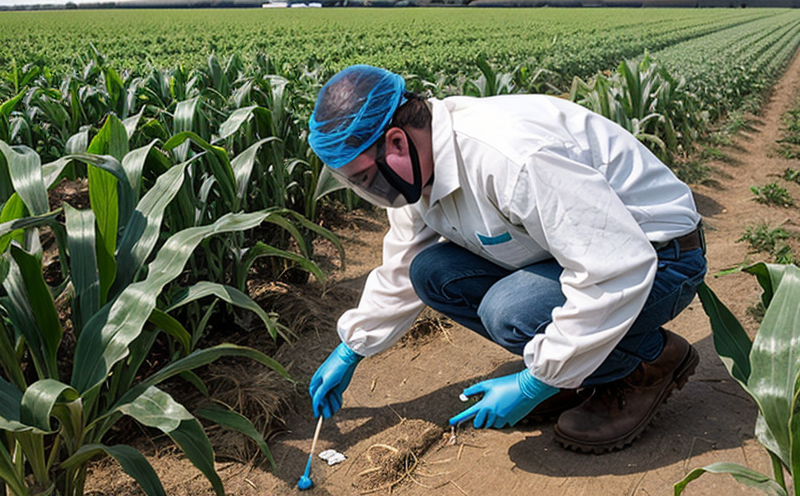Chlorantraniliprole Residue Testing in Crops
The increasing demand for safer and more sustainable agricultural practices has led to a heightened focus on pesticide residue testing. Chlorantraniliprole, an insecticide belonging to the phenylpyrazole class, is widely used due to its broad-spectrum activity against lepidopteran pests. Testing for chlorantraniliprole residues in crops ensures compliance with international standards and protects public health.
Our laboratory provides comprehensive residue testing services using validated analytical methods such as Liquid Chromatography-Mass Spectrometry (LC-MS/MS). This approach is highly sensitive, allowing us to detect even trace amounts of chlorantraniliprole in various crop matrices. The service covers a wide range of crops including maize, wheat, rice, and vegetables.
Understanding the metabolism and persistence of chlorantraniliprole within different plant species is crucial for accurate residue testing. Our experts analyze data from multiple sources to determine safe application rates, ensuring that residues do not exceed permissible limits set by regulatory bodies like the European Food Safety Authority (EFSA) and the U.S. Environmental Protection Agency (EPA).
The importance of chlorantraniliprole residue testing extends beyond mere compliance; it plays a vital role in maintaining consumer confidence and ensuring food safety. By adhering to strict protocols, our laboratory contributes significantly to reducing risks associated with pesticide exposure.
For quality managers and compliance officers overseeing large-scale agricultural operations or importing countries, reliable residue testing is indispensable. Our service offers peace of mind by providing accurate results that can be used for decision-making processes regarding crop acceptance and export certification.
- Precision: Utilizes advanced LC-MS/MS technology to ensure precise measurements.
- Compliance: Meets regulatory requirements set by global standards organizations.
- Safety: Ensures that processed foods meet safety benchmarks, thereby safeguarding public health.
Why It Matters
The significance of chlorantraniliprole residue testing cannot be overstated. Proper management of pesticide residues not only enhances food quality but also promotes sustainable farming practices. Regulatory compliance is essential to prevent potential health hazards while supporting economic growth through international trade.
Consumers increasingly seek assurance that the products they purchase are safe and free from harmful contaminants. By implementing rigorous testing protocols, laboratories like ours help build trust between producers, distributors, retailers, and end-users.
R&D engineers benefit greatly from our services as they can rely on accurate data to refine formulations and improve efficacy without compromising safety. Procurement teams gain confidence knowing that their suppliers meet stringent quality standards.
Scope and Methodology
The scope of chlorantraniliprole residue testing encompasses a variety of crops, each presenting unique challenges due to differences in absorption rates, partition coefficients, and metabolic pathways. Our laboratory specializes in analyzing samples from diverse agricultural settings.
Methodologically speaking, we employ LC-MS/MS which combines the selectivity of liquid chromatography with the sensitivity and specificity of mass spectrometry. This combination allows for highly accurate quantification even at low concentrations.
To prepare samples effectively, we follow standardized procedures outlined in international standards such as ISO 17025. These steps include washing, drying, grinding, extraction, and clean-up processes tailored to the specific crop type being tested.
Acceptance criteria for chlorantraniliprole residue levels vary depending on the intended use of the produce (e.g., direct human consumption vs. animal feed). Our laboratory adheres strictly to these guidelines to ensure consistent quality across all analyses.
Competitive Advantage and Market Impact
- Advanced Technology: Leverages state-of-the-art LC-MS/MS equipment for unparalleled precision.
- Global Standards Compliance: Ensures adherence to international regulations, enhancing market access opportunities.
- Detailed Reporting: Provides comprehensive reports with detailed interpretation of results, aiding informed decisions.
- Swift Turnaround: Offers quick turnaround times without compromising on quality or accuracy.
Our expertise in chlorantraniliprole residue testing positions us as leaders within the agricultural and forestry sectors. By offering precise, reliable, and timely results, we empower stakeholders across the supply chain to make informed choices that support both profitability and environmental responsibility.





